Wednesday, May 7, 2025. Annette’s Roundup for Democracy.
A New York Times expose, at last.
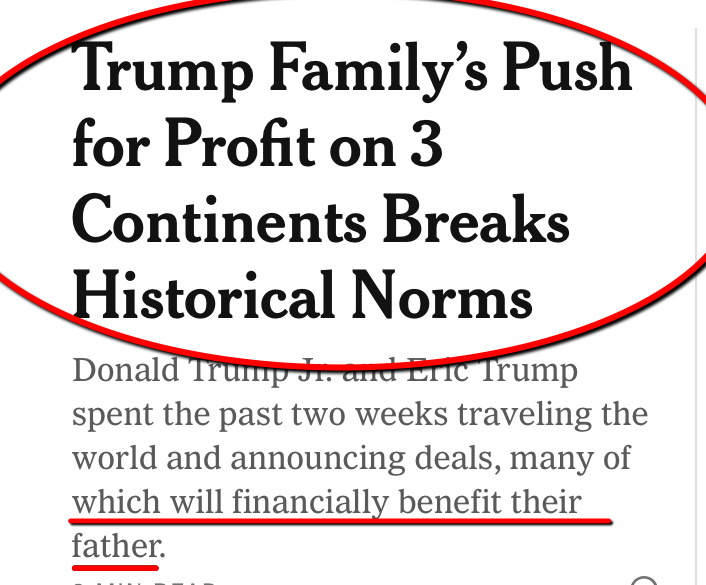
Trump Sons’ Deals on Three Continents Directly Benefit the President.
Donald Trump Jr. and Eric Trump spent the past two weeks traveling the world and announcing new ventures involving billions of dollars.
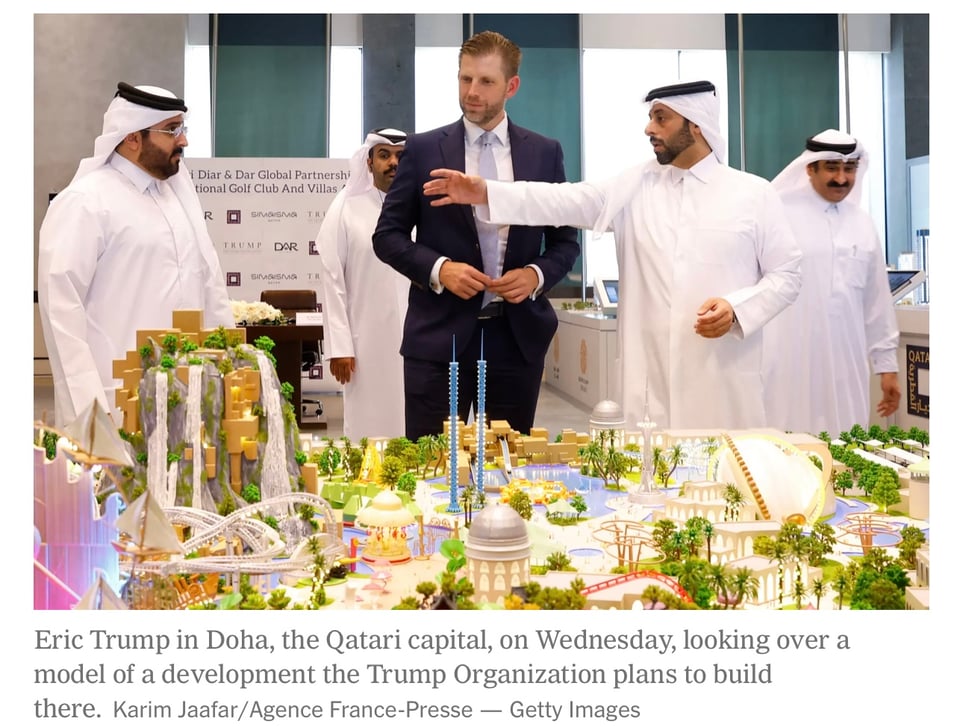
A contest of sorts has played out across Europe, the United States and the Middle East in recent days as President Trump’s two older sons have pursued a blitz of family moneymaking ventures capitalizing on their father’s name and power, each seemingly trying to outdo the other.
It is a rush to cash in that involves billions of dollars with few precedents in American history.
A luxury hotel in Dubai. A second high-end residential tower in Jeddah, Saudi Arabia. Two cryptocurrency ventures based in the United States. A new golf course and villa complex in Qatar. And a new private club in Washington. In many cases these new deals promoted over the last week will personally benefit not only Eric Trump and Donald Trump Jr., but also President Trump himself.
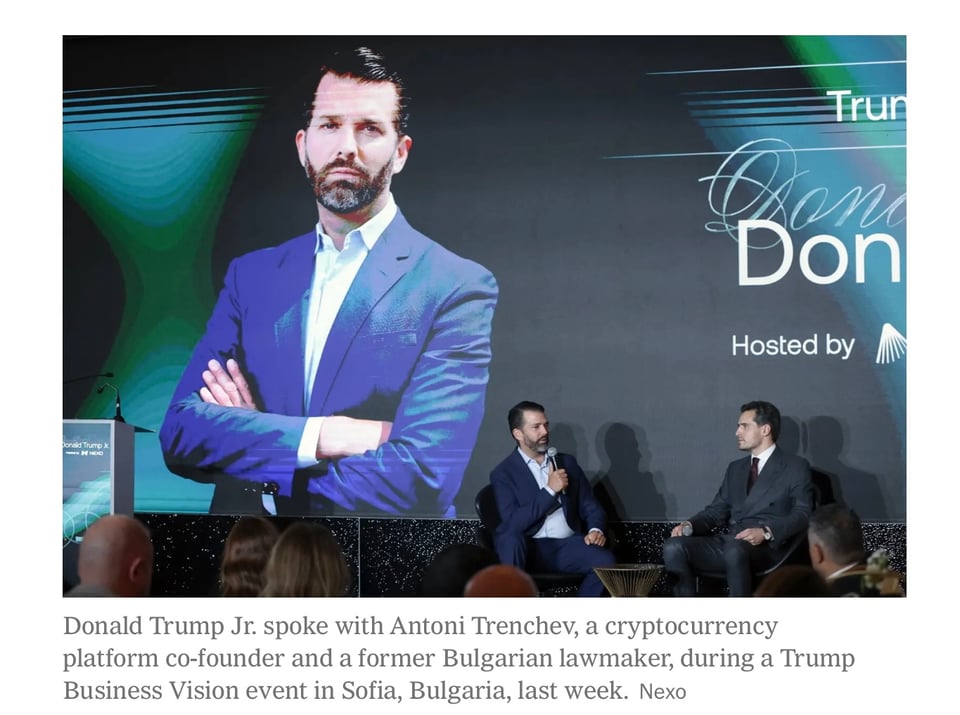
The marathon of deal making has been so rapid that many elements have drawn limited public attention in the United States, despite most of it being out in the open. That is in part because the sons appeared before mostly fawning crowds but also because President Trump, his appointees and his billionaire adviser Elon Musk were making headlines with their own steady stream of norm-breaking controversies.
“There’s nothing like it,” said Douglas Brinkley, a Rice University historian who has written books on Presidents Ronald Reagan and Gerald R. Ford, addressing the financial conflicts of interest that have emerged in Mr. Trump’s second term.
Both Trump sons are involved in a wide range of family business ventures. Eric Trump, the president’s middle son, runs the Trump Organization, the main family business, which specializes in real estate. He also serves on the board of a holding company that oversees World Liberty Financial, the family’s crypto firm, and recently joined forces with his older brother, Donald Trump Jr., to start a Bitcoin mining operation, American Bitcoin.
The White House has said there are no ethics issues because Mr. Trump’s sons run the businesses. “The president’s assets are in a trust managed by his children,” Anna Kelly, a White House spokeswoman, said. “There are no conflicts of interest.”
But Mr. Trump’s financial disclosure report, which he is legally required to file, shows that he still personally benefits financially from most of these ventures.
Eric Trump noted that many of the ventures they are promoting — from crypto to real estate — were underway before their father was re-elected. “We are building the most iconic projects on earth and leading the way in the digital revolution,” Eric Trump said in a statement to The New York Times.
Donald Trump Jr. rejected any suggestion that he was trading on his father’s name, saying he has been a businessman his entire adult life. He then took a swipe at Hunter Biden, who sold paintings while his father, Joseph R. Biden Jr., served as president.
“It’s laughable that the left-wing media thinks that I should lock myself in a padded room while my father is president and cease doing what I’ve been doing for over 25 years to earn a living and provide for my five children,” Donald Trump Jr. said in a statement to The Times. “However, if I did do that, I guess I could always take up painting, which I hear can be quite lucrative.”
Indeed, relatives of other presidents — including Billy Carter (brother of President Jimmy Carter) and Neil Bush (brother of President George W. Bush), along with Hunter Biden — have had business dealings that have created questions about potential conflicts of interest.
What distinguishes the work of Mr. Trump’s two sons is that several of these ventures, including the real estate deals and crypto efforts, bring revenues that benefit the president himself as well.
Just in the past 10 days, Donald Trump Jr. made stops in Hungary, Romania, Serbia and Bulgaria on a paid-speech tour he has called “Trump Business Vision 2025,” which also included visits with foreign government leaders and political candidates. During roughly the same time, Eric Trump was shuttling among Qatar, the United Arab Emirates and other Middle East spots to push the family’s real estate and crypto plans.
These pitches played out even as some of Donald Trump Jr.’s business partners were simultaneously rolling out yet another business in Washington that will cash in on his father’s return to the White House: a club called Executive Branch.
At $500,000 a person, the private membership club is slated to open by this summer in Georgetown in a sprawling, but defunct, restaurant called Clubhouse. It will feature two bars, a lounge, a restaurant and boardroom — re-creating the role previously served by the lobby of the Trump International Hotel in Washington, where donors and acolytes of the president gathered until the family sold it off after Mr. Trump’s first term.

The club soon likely will be jammed with Trump family friends, business executives and members of the Trump administration, but will be off limits to members of the public and most members of the news media.
An A-list party was held late last month to celebrate the launch of Executive Branch — while Donald Trump Jr. was in Europe — at a hotel a block from the White House. Attendees included Pam Bondi, the attorney general, and Paul Atkins, the new chairman of the Securities and Exchange Commission.
The founding members of the club, which has already sold many of its membership slots according to organizers, include Cameron and Tyler Winklevoss, the cryptocurrency executives whose company, Gemini Trust, had been targeted by the S.E.C. until Mr. Trump named new agency leaders, who in April put a hold on the federal lawsuit.
Jeff Miller, a lobbyist and top Trump fund-raiser, is another founding member. In the first quarter of this year, he has registered to represent 39 new corporate clients, including the crypto firm Tether, an overseas operation that was a longtime target of U.S. regulators until recently, when it began to establish itself as a major force in Washington and explore opening a U.S. office.
The other owners at the new club, besides Donald Trump Jr., include Zach and Alex Witkoff — the sons of Mr. Trump’s Middle East envoy — and Omeed Malik, who leads 1789 Capital, a Florida-based venture capital firm that recently hired Donald Trump Jr. as a senior executive. The investments for 1789 Capital have included companies such as Plaid, a digital finance firm that had lobbied the Consumer Financial Protection Bureau related to a new set of banking rules — until Mr. Trump’s team effectively shut down the agency and stalled enforcement of the regulation.
David Sacks, who is a crypto adviser to Mr. Trump and another founding member, said the goal is not to create a venue for access. Rather, he said in a recent podcast, “we want a place to hang out in D.C.” for the “younger, hipper, Trump-aligned Republican.”
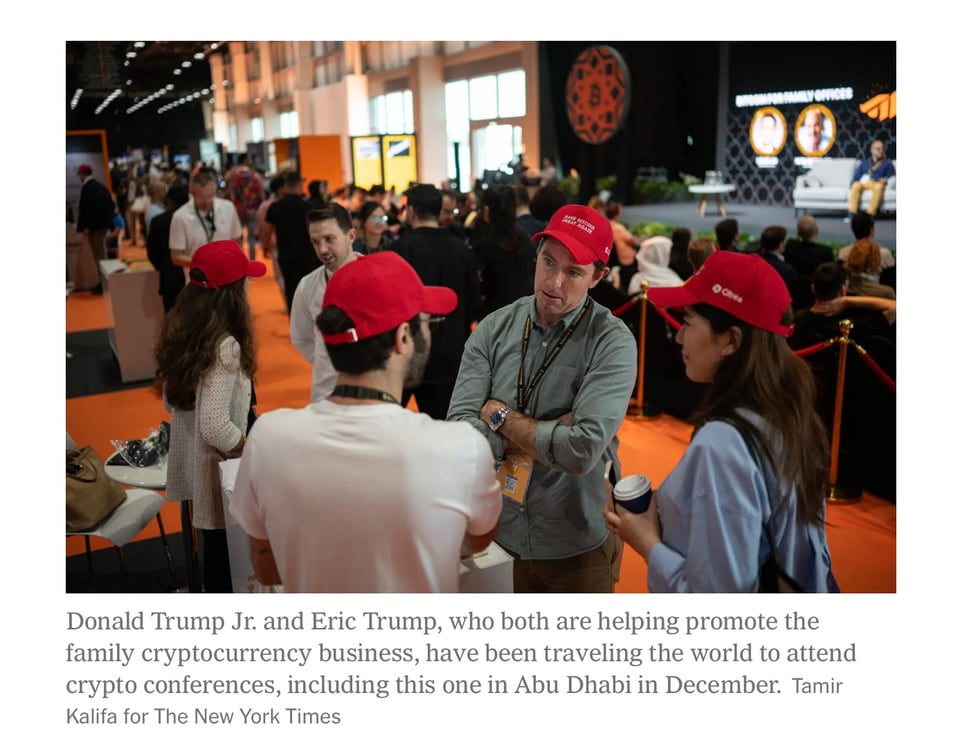
Even as these real-life ventures were playing out, another push for profit was underway in the virtual world. Investors in the $Trump memecoin are bidding to become the top 220 owners of the collectible coin and win a dinner with the president later this month. A memecoin is a type of cryptocurrency based on an online joke or celebrity mascot that has no practical function other than speculation.
The $Trump memecoin is controlled by a company run by the Trump sons and their business partners, but President Trump has actively encouraged his supporters to buy it.
Javier Selgas, chief executive at Fr8Tech, a shipping company, announced this past week — while Eric Trump and Donald Trump Jr. were abroad — that his Monterrey, Mexico-based company would spend $20 million to buy $Trump memecoin tokens.
Buying the tokens — in essence, giving money to the Trump family — is “an effective way to advocate for fair, balanced and free trade between Mexico and the U.S.,” Mr. Selgas said in a statement, which was also filed with the S.E.C., as his company is publicly traded.
In some cases, the Trump-family announcements over the past week have involved foreign governments, including those of Qatar and the United Arab Emirates.
Eric Trump flew to Doha, the capital of the tiny Middle East nation of Qatar, on Wednesday as a government official there signed a deal with a Saudi-based real estate company to build a new Trump golf course and luxury villa complex, a partnership that will bring millions of dollars in branding and management fees to the Trump family.
This is one of six real-estate projects now planned in the Middle East, sponsored by Dar Global, the international subsidiary of a Saudi-based real estate firm with close ties to the Saudi royal family. The other projects are in Saudi Arabia, Oman and Dubai.
“They always arrive at the word ‘yes,’ which is a beautiful thing,” Eric Trump said while in Dubai this past week, saying that it took only a month to get the required real estate permits from the government there. “They do it quickly.”
On a crypto conference panel in Dubai, Eric Trump sat next to Zach Witkoff, one of the founders of the Trump family crypto firm, World Liberty Financial, who announced that a venture capital firm backed by the government of Abu Dhabi would invest $2 billion using a form of digital currency offered by World Liberty. This deal alone could generate hundreds of millions of dollars in revenue for the Trump family and its partners.

Donald Trump Jr. had gotten a head start on his brother, arriving on April 25 in Budapest, where he had a brief meeting with Hungary’s foreign minister, Peter Szijjarto, and then was paid to appear at a dinner gathering among business leaders.
“I’m just here as a business guy, but as someone who understands how the world works,” Donald Trump Jr. told an executive from Portfolio Hungary, the organization that sponsored the event, adding that while he was in Eastern Europe and the Balkans he was looking for possible new deals. “You never know if there is going to be a Trump real estate deal.”
His next stop was Serbia, where the Trump family is planning a new hotel on land owned by the government there. He met with President Aleksandar Vucic, whose administration approved the hotel project, which also includes Jared Kushner, Mr. Trump’s son-in-law, as the developer. “No one has ever said that we are inhospitable: We prepared this pig for Donald Jr Trump,” Mr. Vucic boasted on his Facebook page, about his meal with Mr. Trump.
Donald Trump Jr. then moved on to Bulgaria, where he appeared on a stage along with Antoni Trenchev, the co-founder of a cryptocurrency firm called Nexo that was fined $45 million by the S.E.C. in 2023 and agreed to leave the U.S. marketplace.
With Donald Trump Jr. at his side, Mr. Trenchev announced that Nexo had already talked to United States regulators and it was re-entering the U.S. market. “America is back — and so is Nexo,” Mr. Trenchev said, celebrating his meeting where he paid to be with the son of the president of the United States, as well as the company’s pending return to the market there.
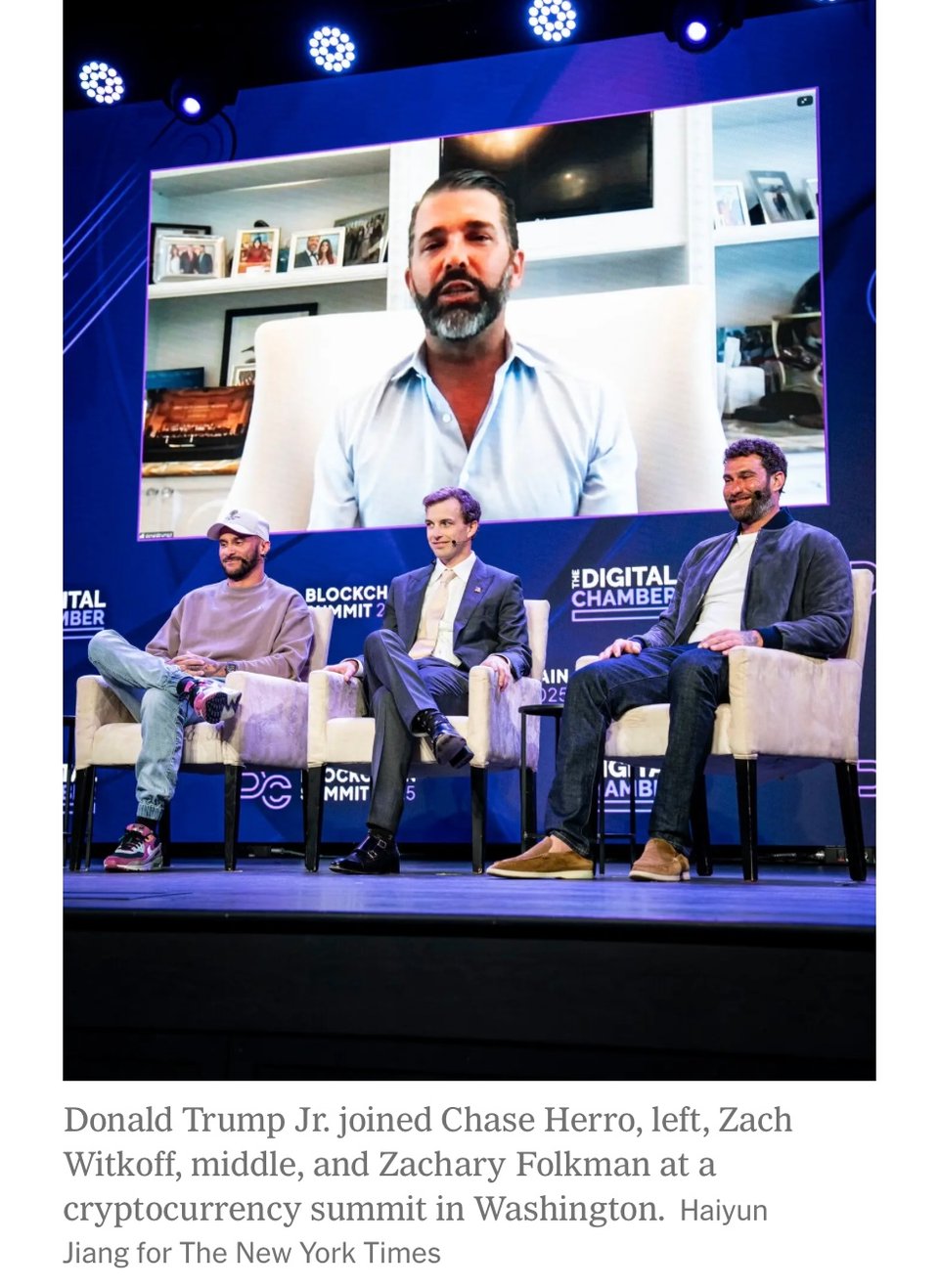
President Trump, in recent days, was doing his part as well to help drive business to the family.
He attended a fund-raising event at his Mar-a-Lago club in Florida this past weekend. That makes his 10th visit to the club since he returned to the White House in January, with many of the weekend visits featuring political gatherings that pay bills to his family. (New York Times).
What Donald Trump doesn’t know and when he doesn’t know it.
Due Process, the Constitution in Trump’s cross-hairs.
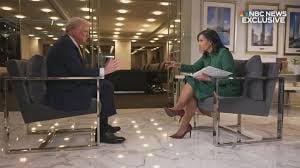
In an interview aired today [Sunday] on NBC News’s Meet the Press, reporter Kristen Welker asked President Donald J. Trump if he agreed that every person in the United States is entitled to due process.
“I don’t know. I’m not, I’m not a lawyer. I don’t know,” Trump answered.
The U.S. Constitution guarantees that “no person shall…be deprived of life, liberty, or property, without due process of law.” Judges across the political spectrum agree that the amendment does not limit due process to citizens. In his decision in the 1993 case Reno v. Flores, conservative icon Justice Antonin Scalia wrote: “it is well established that the Fifth Amendment entitles aliens to due process of law in deportation proceedings.”
In his oath of office, Trump vowed to “preserve, protect and defend the Constitution of the United States.”
When Welker pointed out that the Constitution guarantees due process, Trump suggested he could ignore it because honoring due process was too slow. “I don’t know,” he said. “It seems—it might say that, but if you’re talking about that, then we’d have to have a million or 2 million or 3 million trials,” he said. “We have thousands of people that are—some murderers and some drug dealers and some of the worst people on Earth.”
“I was elected to get them the hell out of here, and the courts are holding me from doing it,” he added.
Welker tried again. “[D]on’t you need to uphold the Constitution of the United States?”
Trump replied: “I don’t know. I have to respond by saying, again, I have brilliant lawyers that work for me, and they are going to obviously follow what the Supreme Court said.”
(Source. Heather Cox Richardson, Letters from an American, based on Trump interview on Meet the Press,of Sunday, May 4, 2025.)
One more thing.
By Monday night, the Pope Aspirant was claiming he never posted the photo of himself in full pontifical regalia.
As horrific as it was that he did this, I thought you should see it once again, so Trump’s crude and disrespectful behavior would be imprinted in your mind.
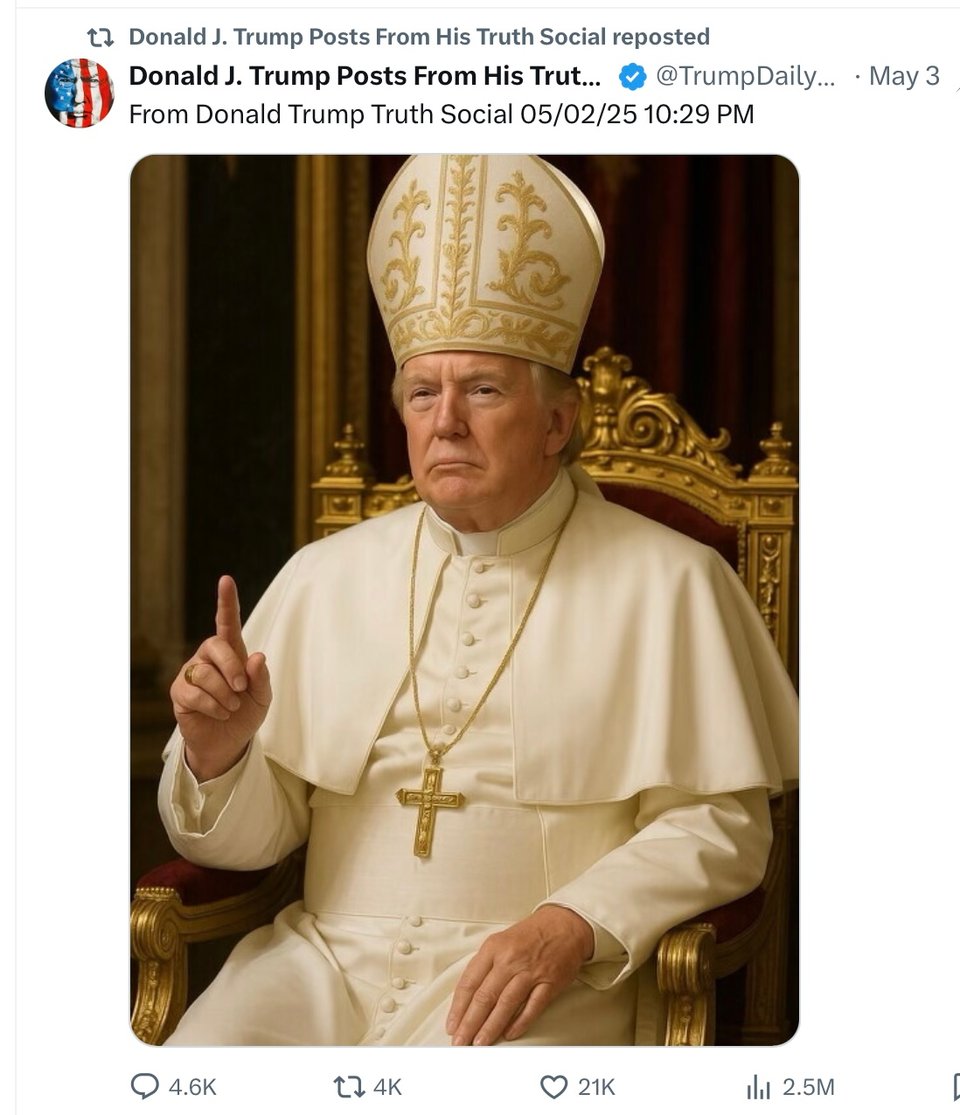
Representative Jasmine Crockett - a woman he insults regularly- had this sane retort.👇
BREAKING: Jasmine Crockett just DESTROYED Donald Trump in an amazing floor speech: "Instead of the president cosplaying as the next Pope, he may wanna try to cosplay as an actual president of these United States." She’s the BEST!
— CALL TO ACTIVISM (@CalltoActivism) May 6, 2025
pic.twitter.com/fO3eC9DBT1
Groups, like the NY State Catholic Conference, spoke up too.
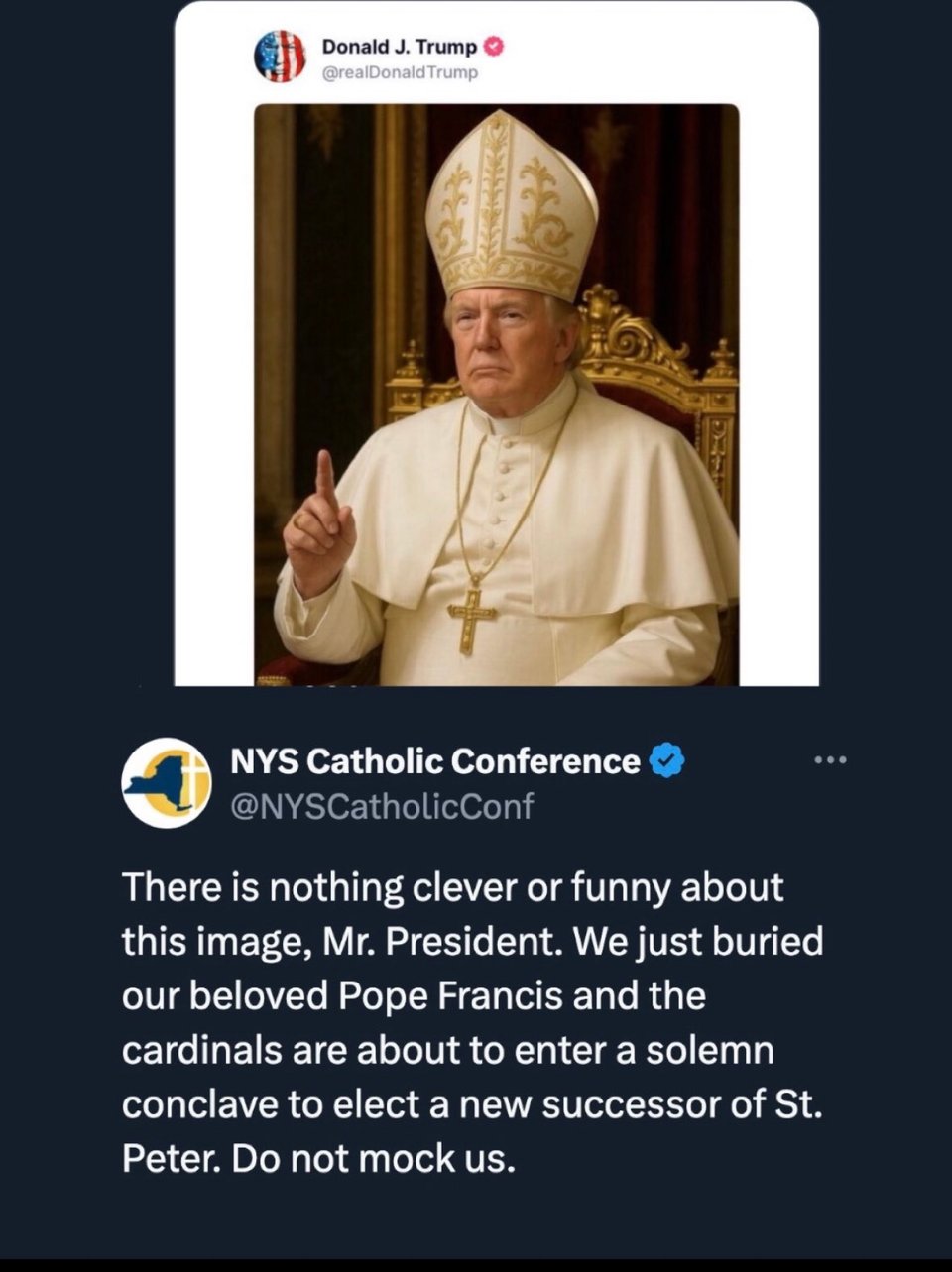
Another head of an allied nation visits the Oval Office.
Prime Minister Mark Carney of Canada.
Trump embarrassed us in front of the world again.
I look forward to meeting the new Prime Minister of Canada, Mark Carney. I very much want to work with him, but cannot understand one simple TRUTH — Why is America subsidizing Canada by $200 Billion Dollars a year, in addition to giving them FREE Military Protection, and many…
— Donald J. Trump Posts From His Truth Social (@TrumpDailyPosts) May 6, 2025
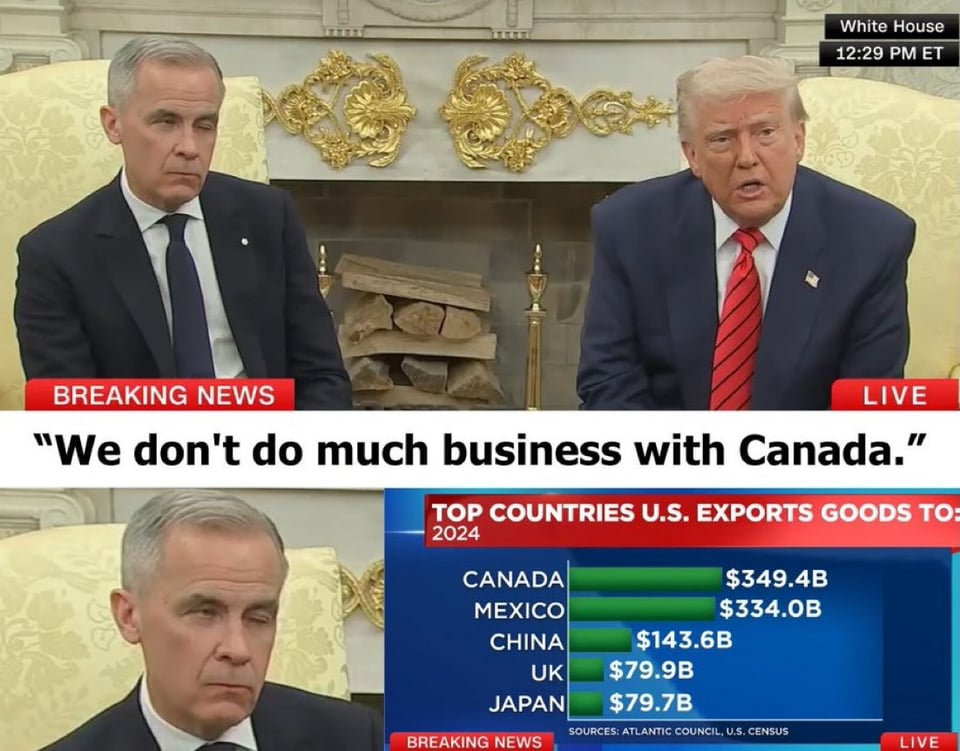
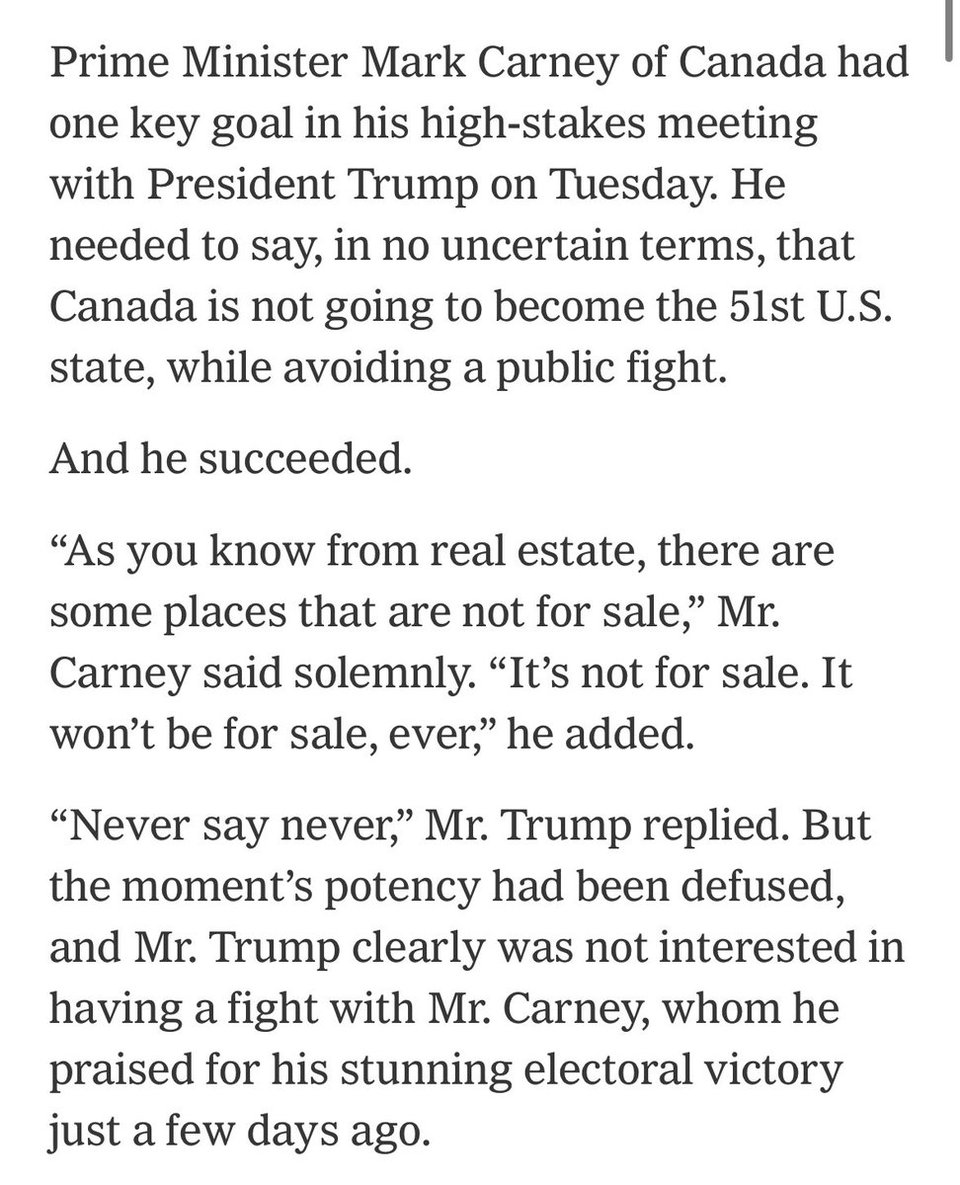
The Mineral Deal between Ukraine and the U.S
It hasn’t gotten much attention, but former American Ambassador to Russia Michael McFaul under President Obama lays out the fascinating details and implications of the deal.
The US-Ukraine “Minerals Deal” is Win-Win for Americans and Ukrainians
When I first heard about the original idea for a “minerals deal” between Ukraine and the United States, I must admit that I was not a fan. It sounded like old-school colonial exploitation. What was especially appalling to me was that President Trump seemed to be taking advantage of a country desperate to secure financial benefits for the United States. Ukrainian officials had no choice but to engage in negotiations on this deal, recognizing that losing American support—particularly in military assistance and intelligence sharing— would severely undermine Ukraine’s war efforts against the Russian invading army. My fears about this deal only deepened after the disastrous meeting between President Trump and President Zelenskyy in the Oval Office on February 28, 2025, when the agreement was supposed to be signed. After that fiasco, I assumed the agreement would only get worse.
I was wrong. Behind closed doors, without cameras rolling as there were during the Oval Office meeting, Secretary Bessent, First Deputy Prime Minister Svyrydenko, and their teams calmly and constructively negotiated a final agreement that is favorable to both countries. On April 30, 2025, both Ukraine and the United States signed the “Agreement between the Government of Ukraine and the Government of the United States of America on the Establishment of a United States-Ukraine Reconstruction Investment Fund.”
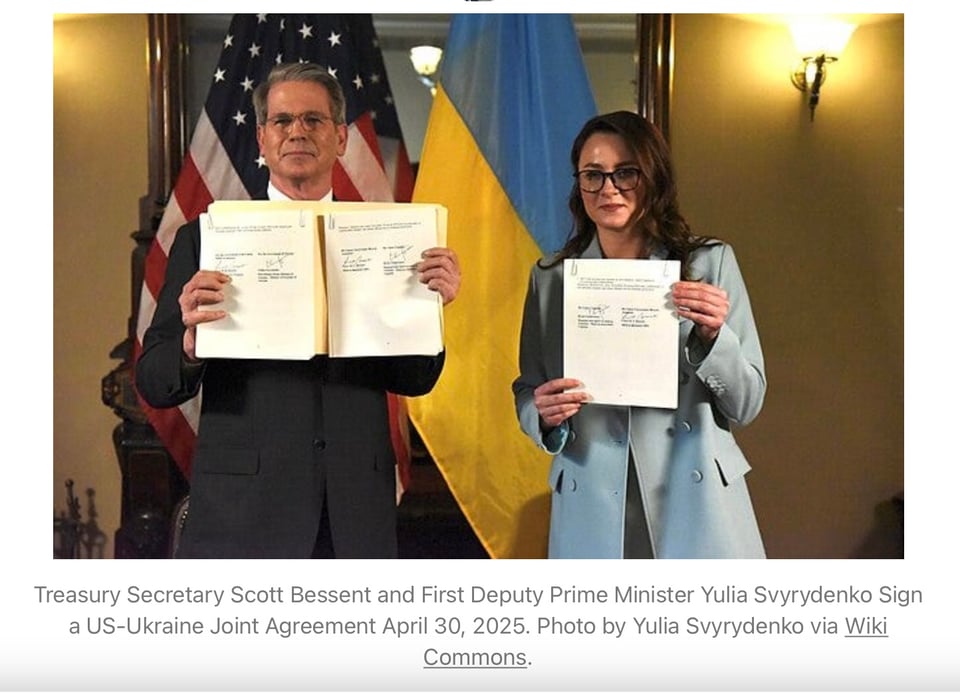
As part of this deal, Ukraine and the United States established a joint investment fund for the reconstruction of Ukraine, which both countries will manage on an equal partnership basis. As in earlier versions, Ukraine will contribute 50 percent of its revenues from the new minerals, oil, and gas projects to the fund, but unlike before, it will retain full ownership over its “subsoil, infrastructure, and natural resources,” including decisions on what to extract. While this deal provides no credible security guarantees to Ukraine, it affirmed American “support for Ukraine’s security, prosperity, reconstruction, and integration into global economic frameworks.” Additionally, this deal states that “no state or person who financed or supplied the Russian war machine will be allowed to benefit from the reconstruction of Ukraine.”
Equally important is what is not in this agreement. Earlier reports indicated that President Trump insisted that profits from the minerals deal be used to repay the United States for the military and economic aid already provided. Thankfully, that formulation did not make it to the final version of the agreement. That, of course, is good for Ukraine, but it is also good for the United States. The earlier aid packages approved by the U.S. Congress and President Biden contained no such repayment provisions. Trump’s attempt to add them after the fact would have done serious damage to America’s reputation and made future agreements hard to negotiate with any country, not just Ukraine.
Of course, building the mines to extract these minerals takes years, if not decades. If it were easy, Ukrainian businesspeople would have done it already. As a CSIS report on this deal states, there are many barriers, including “outdated geological surveys, degraded energy infrastructure, and unresolved security risks.” Moreover, some of Ukraine’s most mineral-rich areas are believed to be in the eastern part of the country—a region currently occupied by Russian forces.
Another sad reality is that the signing of this deal has not altered the fundamental negotiating position of the Trump administration regarding the war. Trump and his team have promised Putin all sorts of concessions as a strategy to get him to sign a ceasefire, while simultaneously deploying coercive measures against Ukraine to compel Zelenskyy to sign a ceasefire. That strategy is not working, as I wrote a few weeks ago. (Read that essay here.) To date, Zelenskyy has agreed to a 30-day unconditional ceasefire, and Putin has not.
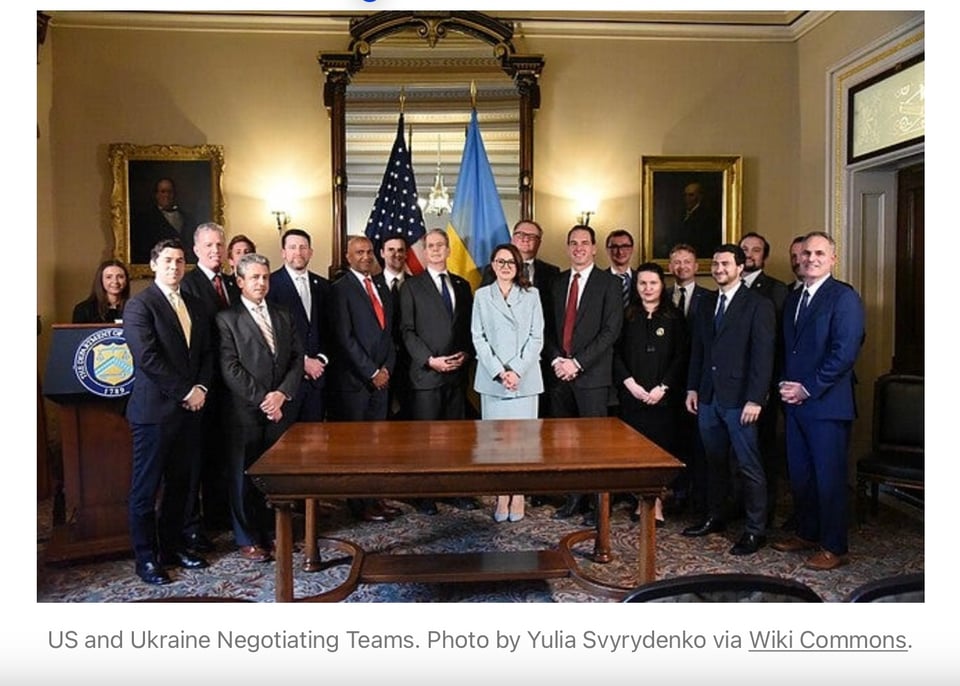
Nonetheless, the new agreement between Ukraine and the United States does seem to have propelled some renewed bilateral military cooperation. Last week, on the day the agreement was signed, the Trump administration approved a new disbursement of $50 million in weapons sales. Trump has not signaled any enthusiasm for proposing a new aid package for Ukraine, but at least he appears to be committed to finishing the provision of aid already approved during the Biden administration. Of particular importance to Zelenskyy, the Trump administration is also supporting the deployment of another Patriot missile defense system (to be provided by Israel, but overhauled by the United States). That’s progress.
And in the long run, American investors, entrepreneurs, and companies must be part of Ukraine’s reconstruction efforts. The “Agreement between the Government of Ukraine and the Government of the United States of America on the Establishment of a United States-Ukraine Reconstruction Investment Fund” is a positive step toward that win-win objective.(Michael McFaul, Substack)
Wins and interpretations.
A Big Victory.
Judge Orders Elections Board to Certify Democrat’s Victory in Contested N.C. Race.
The federal ruling on Monday was the most significant legal victory yet for Justice Allison Riggs, the Democratic incumbent in a State Supreme Court race. (New York Times).
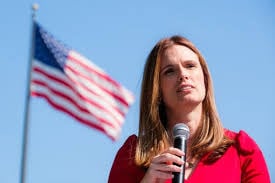
The NC Supreme Court seat will be occupied by Allison Riggs.
Did the law firms which capitulated to Trump capitulate at all?
The firms say no, on pro bono requirements.
NEW: The law firms that capitulated to Trump are privately telling congressional Dems they are under no obligation to take on pro-bono clients the president demands, per letters we obtained. It's unclear if Trump reads the deal the same way. The WH didn't comment. pic.twitter.com/knJ0XQUOaC
— Sam Stein (@samstein) May 6, 2025
J.D. Vance just isn’t that popular.
Completely humiliating that the sitting Vice President personally campaigned for his brother — and he pulled just 11.9% in the Cincinnati mayor’s race. pic.twitter.com/obbz4MGeoW
— Matt McDermott (@mattmfm) May 7, 2025
First, the Gulf of America, then an attack on Veterans Day.
Trump tried to hijack Veterans Day and rename it “Victory Day.” Veterans groups pushed back hard—and the White House folded.
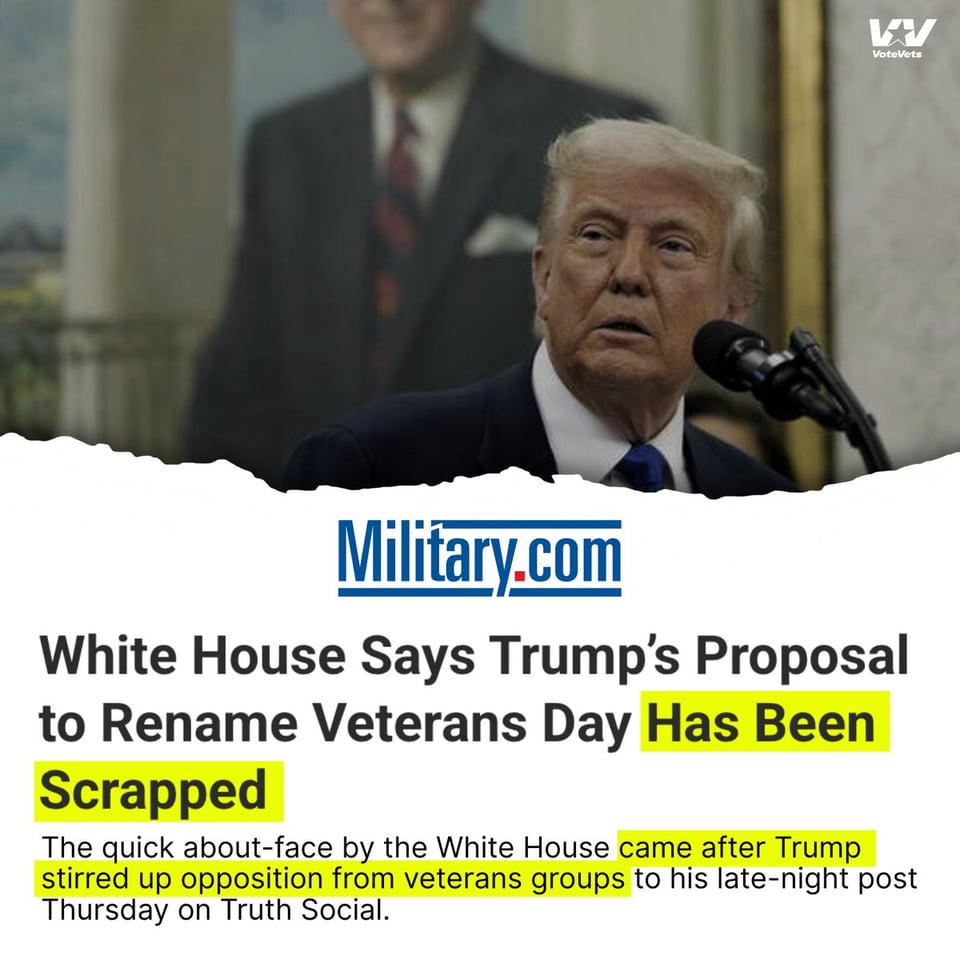
Stay tuned. The rumor is he will try to change the name of the Persian Gulf this week.
Health matters during the rule of Kennedy, HHS Secretary.
Eve and I are having blood work to determine if we have measles protection.
Should you?
Some adults may need a measles booster shot. Who should get one? Why?
Measles, once considered eliminated in the United States, has been making an unfortunate comeback. With recent outbreaks in various states, health experts are urging some adults to check their vaccination status. While most people are protected, some may need a booster shot to ensure they remain immune.
What to know about measles
Measles, also called rubeola, is a highly contagious viral infection that spreads through respiratory droplets when an infected person coughs or sneezes. The virus can linger in the air and on surfaces for hours, making it easy to catch if you're not immune.
Symptoms typically appear 10 to 14 days after exposure and include:
high fever
cough
runny nose
red, watery eyes
small, white bumps on the inside of the mouth
measles rash: flat red spots, sometimes with small raised bumps on top. Rash typically starts on the face and spreads downward, across the arms, trunk, legs, and feet.
Measles can lead to serious complications, including pneumonia, brain swelling (encephalitis), blindness, hearing loss, and even death, particularly in young children, pregnant women, and people with weakened immune systems.
"We worry about the outbreaks because measles is a highly contagious infection," explains Dr. Michelle Chan, an infectious disease physician at Beth Israel Deaconess Medical Center and an instructor in medicine at Harvard Medical School. "Individuals who have not been immunized, children too young for the vaccine, and those who are immunocompromised can become very ill from measles."
The best way to prevent measles is through vaccination. Prior to the introduction of widespread vaccination programs, measles was responsible for approximately 2.6 million deaths worldwide.
In the United States and other developed nations, the initial vaccine is administered between 12 and 15 months of age, followed by a second dose at 4 to 5 years old. Overall, the vaccine has a strong safety profile. Side effects are mostly mild, and the vaccine has no link to autism.
Could you benefit from a measles booster shot?
The measles vaccine, given as part of the measles-mumps-rubella (MMR) shot, provides long-term immunity. A single dose of the MMR vaccine is 93% effective at preventing illness, while two doses increase effectiveness to 97%. However, not everyone has the same level of protection.
For example, prior to 1989, one dose of the MMR vaccine was standard, so most people born before 1989 likely received only one dose. According to Dr. Chan, "One dose of the MMR vaccine is highly effective, but certain populations who are at high risk of exposure — such as health care workers, international travelers, and close contacts of immunocompromised individuals — may want to be proactive about ensuring they've received the full series of vaccinations."
In addition, individuals vaccinated between 1963 and 1967 may have received a less effective, inactivated (killed) version of the measles vaccine. "Anyone who received the inactivated vaccine or is unsure of the type they received should get one to two doses of the MMR vaccine," Dr. Chan advises.
If you're not sure of your immunization history and your medical records are unclear, getting an extra dose of the MMR vaccine is a safe and effective option. "If you are unsure, you can choose to take a dose of the vaccine. It is very safe and not harmful if you happen to receive an additional dose," Dr. Chan reassures.
Because of the high rates of measles in the U.S. prior to 1957, anyone born before 1957 is presumed to have had measles or been exposed to the virus and, as a result, does not need a measles vaccine or booster shot.
Who should consider a measles booster and why?
The Centers for Disease Control and Prevention (CDC) recommends that certain adults check their measles immunity and get a booster shot if necessary. You may need a booster if:
You received the inactive measles vaccine between 1963 and 1967. This version was not fully effective, so you may not be protected.
You work in health care or a setting with high exposure risk and have had only one dose of the measles vaccine. Working in a hospital, school, or child care center can increase the chance of exposure to measles.
You are unsure of your vaccination status. If you don't have documentation or a history of measles infection, you may opt to get a dose of the MMR vaccine.
You are traveling internationally. Some countries still have high measles rates, and travelers are at risk of bringing the virus back home.
If you fall into one of these higher-risk groups, check your vaccination status and speak with your doctor about a measles vaccine booster.
"It all comes back to vaccines — this is our most effective method of preventing measles infection and resurgence," Dr. Chan emphasizes. (Health.Harvard.edu)

Former WaPo Cartoonist Completes Ownership of Jeff Bezos
Ann Telnaes Kicks Toadying Oligarch's Ass Yet Again
